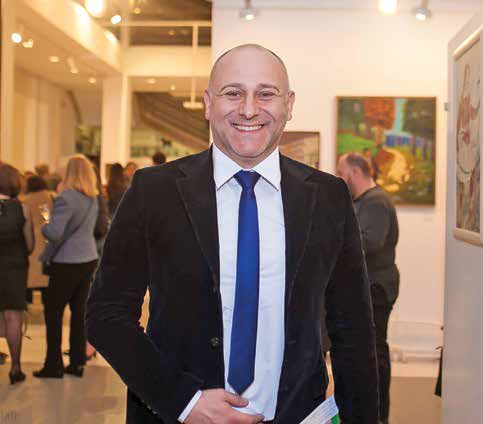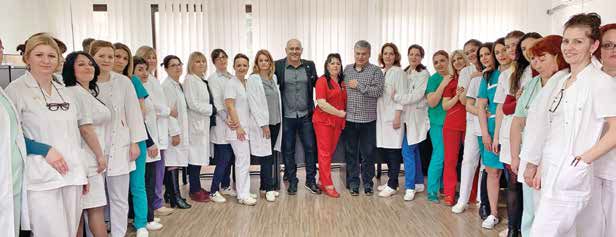The College of Applied Health Sciences (CAHS) Ćuprija is a state-run, accredited institution with the curriculum educate the most sought-after medical worker profiles. In a modern building, spanning 6,400 square metres in an excellent location, the college is accessible and popular among young people from all over the country.

“We are making a great effort to provide the education of as many students as possible, and year-onyear, there is a growing interest for studying at our school. In addition to the social programme, for which we received the award as the socially most responsible institution in Serbia, I would like to underline the continued investments in infrastructure, teaching and equipment, education of teaching staff and developed international cooperation,” Christos Alexopoulos, PhD, Director of College of Applied Health Sciences Ćuprija.
What countries do your students come from and how many are attending the classes at your college with an idea of leaving for abroad once they graduate? If they do leave for abroad, what kind of advantages does your diploma have?
— The College of Applied Health Sciences Ćuprija is one of only two independent state-accredited schools in Serbia that provide higher education for nurses. Young people are very interested in studying at our school, and they come not only from Serbia but also from abroad, particularly from neighbouring countries. Almost every day, parents from Montenegro, Bosnia and Macedonia schedule interviews to find out more about how to enroll their children to our school. Our college’s diploma is recognized worldwide, as witnessed by numerous members of our alumni club who just found work in countries such as Switzerland, Germany, Norway and the United Arab Emirates (Dubai). Our school’s Alumni Club is a voluntary association which students who have completed basic and / or specialist studies at the CAHS Ćuprija can join without charge, with the aim of connecting all generations of students to exchange knowledge, experience and establishing mutual cooperation in the country and abroad. In addition to regular English language classes, the school holds free German courses with the view of students obtaining the TELC certificate that our graduates need if they want to find employment in German-speaking countries where the demand for medical staff is the strongest.
Which accredited study programmes do you offer?
— The school currently has five accredited study programmes at basic studies; Professional Nurse, Professional Physiotherapist, OBGYN Nurse, Professional Pharmacist and Professional Medical Radiologist. Our study programmes last for six semesters or three years and bring 180 ESPB points. After completing the study programme and passing the final exam, that consists of undergraduate dissertaion and verbal presentation, our students have obtained a vocation. The purpose of our study programmes is to educate the required staff in the light of new approaches to health and health policy based on the protection and improvement of health, which require the application of medical functions and competencies. With the help of the high quality teaching process, our students master basic theoretical and practical knowledge which provides them with guidance for the future. Professional nurses, midwives, radiologists, physiotherapists and pharmacists are trained for work in hospitals, health centres, dispensaries, counseling centres, health care services, health care facilities, sanatoriums, nursing homes, schools, and preschool institutions, and they occupy an important place in the health care system. We are currently undergoing accrediation for our Master’s studies, that will last two years. They bring 120 ESPB points and once our students finish their Master’s studies, they obtain the title of the nurse-organizer in the health care system. We also have a series of short study programmes that last semesters in the segment of anesthesia and reanimation, domicilary care, rehabilitation, dermatological cosmetology and interventional radiology.
To what degree do your school’s programmes comply with EU standards?
— In order to better integrate into European processes, we will soon begin implementing European directives. Consequentially, we have recently signed a cooperation agreement with University of Rijeka’s Faculty of Health Care Studies, which curriculum complies to the EU Directive 55/13. In order to complete the required preparation, we have established communication with an institution that is more experienced and from which we can learn how we can implement the directives as soon as possible. Soon we will submit the new curricula for accreditation, as we want them to be based on these directives.
Your school was recently rewarded for excellence in social responsibility? What does this award mean to the school?
— I would say that the last year in our school was all about social responsibility. We have fulfilled our social obligations through several strategies, thus giving an example to other institutions and inviting them to join in. By signing a contract with the Ministry of Defence, we gave scholarships to children of deceased soldiers and employees of the Serbian Army, while the students from families with four or more children can now attend our school for free. Also, the same goes for students with special and for these students we facilitated better access to the school and provided special parking spaces. We are also planning to install a lift in the school. For several consecutive years now, we have been employing people with special needs, and we are also preparing free IT courses for senior citizens.

How much are you focusing on training your teachers and investing in equipment?
— The College of Applied Health Sciences in Ćuprija is continuously working on improving professional and research work, while it stimulates the existing and creates new conditions, and implements research results in the teaching process. We are recognized by the highly developed international cooperation that is reflected in the exchange of students and professors, our students attending higher education institutions in Norway and us implementing projects which results are applied in the accreditation of basic, specialist and master study programmes. Scientific, educational and research activities are also developed since we are a member of the European Nursing Module (ENM) network. In the past period, investing in equipment was one of our school’s priorities. We can boast new cabinets and multimedia classrooms, and as of recently, a server room with an optical link so that students can master the IZIS programme. There is also a pharmacy block with pharmacy, and a galenical and chemical laboratory. I would also like to mention the ongoing construction of simulation centre which is the first and so far, the only such centre in the region that has the latest teaching aids and equipment. The President of the Republic of Serbia, Aleksandar Vučić will officially open the centre. Mannequins Juno and Chloe help students to familiarize themselves with real-life situations through various health care scenarios.
Considering that the sate authorities have decided to stimulate not only dual education high schools but also vocational colleges, what are your ambitions in this respect?
— In its very nature, our school has always provided some form of dual education. Since the school’s inception, the students of the then Medical College carried out their work practice in hospitals, health centres, spas and other health care institutions. It is impossible to educate medical staff separate from the work that they are being educated for.
What values do you instil in your students?
— Although nurses, midwives and technicians are not obligated to take Hippocratic Oath, we try to transfer the values that bind them to ethical work in their respective professions. In addition to the traditional educational values that teachers instil in their students, we also remind them of the humane and moral values they have to have as caregivers, as well as the confidentiality they are obligated to keep in relation to patients. We strive to raise awareness that their future profession is one of the noblest and most responsible profession around and, accordingly, that they develop a relation with their future vocation.